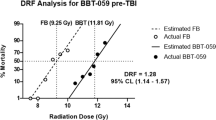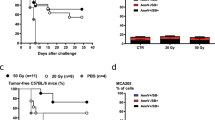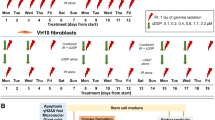Abstract
ATP-induced tumour growth inhibition is accompanied by a selective decrease in the content of the tripeptide glutathione (CSH) within the cancer cells in vivo. Depletion of cellular GSH sensitizes tumours to chemotherapy and radiation, but the usefulness of this depletion depends on whether the levels of GSH can be reduced in the tumour relative to normal tissues. We report here that administration of ATP in combination with diethylmaleate and X-rays leads to complete regression of 95% of Ehrlich ascites tumours in mice. This shows that an aggressive tumour can be eliminated by using a therapy based on modulation of GSH levels in cancer cells.
This is a preview of subscription content, access via your institution
Access options
Subscribe to this journal
Receive 12 print issues and online access
$209.00 per year
only $17.42 per issue
Buy this article
- Purchase on Springer Link
- Instant access to full article PDF
Prices may be subject to local taxes which are calculated during checkout
Similar content being viewed by others
References
Rapaport, E., Fishman, R.F. & Gercel, C. Growth inhibition of human tumor cells in soft-agar cultures by treatment with low levels of adenosine 5'-triphosphate. Cancer Res. 43, 4402–4405 (1983).
Chahwala, S.B. & Cantley, L.C. Extracellular ATP induces ion fluxes and inhibits growth of Friend erythroleukemia cells. J. biol Chem. 259, 13717–13722 (1984).
Weisman, G.A. et al. Growth inhibition of transformed mouse fibroblasts by adenine nucleotides occurs via generation of extracellular adenosine. J. biol. Chem. 263, 12367–12372 (1988).
Rapaport, E. Experimental cancer therapy in mice by adenine nucleotides. Eur. J. Cancer clin. Oncol. 24, 1491–1497 (1988).
Lasso de la Vega, M.C. et al. Inhibition of cancer growth and selective glutathione depletion in Ehrlich tumour cells in vivo by extracellular ATP. Biochem. J. 298, 99–105 (1994).
Rapaport, E. & Fontaine, J. Anticancer activities of adenine nucleotides in mice are mediated through expansion of erythrocyte ATP pools. Proc. natn. Acad. Sci.U.S.A. 86, 1662–1666 (1989).
Meister, A. Selective modification of glutathione metabolism. Science 220, 470–477 (1983).
Estrela, J.M. et al. Regulation of glutathione metabolism in Ehrlich ascites tumour cells. Biochem. J. 286, 257–262 (1992).
Mitchell, J.B., Cook, J.A., DeGraff, W., Glatstein, E. & Russo, A. Glutathione modulation in cancer treatment: will it work? Int. J. Radiat Oncol. Biol. Phys. 16, 1289–1295 (1989).
Arrick, B. & Nathan, C.F. Glutathione metaboli sm as a determinant of therapeutic efficacy: a review. Cancer Res. 44, 4224–4232 (1984).
Meister, A. Glutathione deficiency produced by inhibition of its synthesis, and its reversal; applications in research and therapy. Pharmac. Ther. 51, 155–194 (1991).
Mitchell, J.B. & Russo, A. The role of glutathione in radiation and drug induced cytotoxicity. Br. J. Cancer 55, 96–104 (1987).
Terradez, P. et al. Depletion of tumour glutathione in vivo by buthionine sulfoximine: modulation by the rate of cellular proliferation and inhibition of cancer growth. Biochem. J. 292, 477–483 (1993).
Nishizuka, Y. The molecular heterogeneity of protein kinase C and its implications for cellular regulation. Nature 334, 661–665 (1988).
Lee, F.Y.F., Allalunis-Turner, M.J. & Siemann, D.W. Depletion of tumor versus normal tissue glutathione by buthionine sulfoximine. Br. J. Cancer 56, 33–38 (1987).
Ehrlich, P. & Apolant, H. Beobachtungen uber maligne Mausetumoren. Berl. Klin. Wschr. 42, 871–874 (1905).
Lopes, N.M., Black, P., Ashford, A.J. & Pain, V.M. Protein metabolism in the tumour-bearing mouse. Rates of protein synthesis in host tissues and in an Ehrlich ascites tumour at different stages in tumour growth. Biochem. J. 264, 713–719 (1989).
Planet, G. & Fox, I.H. Inhibition of phosphoribosylpyrophosphate synthesis by purine nucleosides in human erythrocytes. J. biol. Chem. 251, 583–5844 (1976).
Snyder, F.F. & Seegmiller, J.E. The adenosine-li ke effect of exogenous cyclic AMP upon nucleotide and PP-ribose-P concentrations of cultured human lymphoblasts. FEBS Lett. 66, 102–106 (1976).
Fox, I.H. & Kelley, W.N. The role of adenosine ar d 2'-deoxyadenosine in mammalian cells. Ann. Rev. Biochem. 47, 655–686 (1978).
McClard, R.W., Black, M.J., Livingstone, L.R. & Jones, M.E. Isolation and initial characterization of the single polypeptide ihat synthesizes uridine 5'-monophosphate from orotate in Ehrlich ascites carcinoma. Purification by tandem affinity cromatography of uridine-5'-monobhosphate synthase. Biochemistry 19, 4699–4706 (1980).
Dethmers, J.K. & Meister, A. Glutathione export by human lymphoid cells: Depletion of glutathione by inhibition of its synthesis decreases export and increases sensitivity to irradiation. Proc. natn. Acad. Sci. U.S.A. 78, 7492–7496 (1981).
Bump, E.A. & Brown, J.M. Role of glutathione in the radiation response of mammalian cells in vitro and in vivo. Pharmac. Ther. 47, 117–136 (1990).
Mistry, P. & Harrap, K.R. Historical aspects of glutathione and chemotherapy. Pharmac. Thri. 49, 125–132 (1991).
Garlick, P.J., McNurlan, M.A. & Preedy, V.R. A rapid and convenient technique for measuring the rate of protein synthesis in tissues by injection of 3H-pheny-lalanine. Biochem. J. 192, 719–723 (1980).
Rottenberg, H. The measurement of membrane potential and ApH in cells, organelles, and vesicles. Meth. Enzym. 55, 547–569 (1979).
Akerboom, T.P.M. & Sies, H. Assay of glutathione, glutathione disulfide, and glutathione mixed disulfides in biological samples. Meth. Enzym. 77, 373–382 (1981).
Asensi, M. et al. A high-performance liquid chromatography method for measurement of oxidized glutathione in biological samples. Anal. Biochem. 217, 323–328 (1994).
Bergmeyer, H.U. Methods of Enzymatic Analysis. 3rd edn VHC, Weinheim, Germany, 1985.
Hisata, T. & Tatibana, M. Control of de novo pyrimidine biosynthesis in mammalian tissues. Levels and turnover of early intermediates in mouse spleen in vivo. Eur. J. Biochem. 105, 155–161 (1980).
Yates, R.A. St Pardee, A.B. Pyrimidine biosynthesis in Escherichia coll. J. biol. Chem. 221, 743–756 (1956).
Author information
Authors and Affiliations
Rights and permissions
About this article
Cite this article
Estrela, J., Obrador, E., Navarro, J. et al. Elimination of Ehrlich tumours by ATP-induced growth inhibition, glutathione depletion and X-rays. Nat Med 1, 84–88 (1995). https://doi.org/10.1038/nm0195-84
Received:
Accepted:
Issue Date:
DOI: https://doi.org/10.1038/nm0195-84
This article is cited by
-
Designing bioresponsive nanomaterials for intracellular self-assembly
Nature Reviews Chemistry (2022)
-
Metabonomics study of the effects of single copy mutant KRAS in the presence or absence of WT allele using human HCT116 isogenic cell lines
Metabolomics (2021)
-
Purinergic signalling and cancer
Purinergic Signalling (2013)
-
Glutathione and Bcl-2 targeting facilitates elimination by chemoradiotherapy of human A375 melanoma xenografts overexpressing bcl-xl, bcl-2, and mcl-1
Journal of Translational Medicine (2012)
-
A case of serendipity*
Purinergic Signalling (2008)



